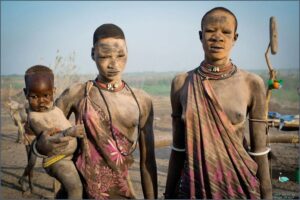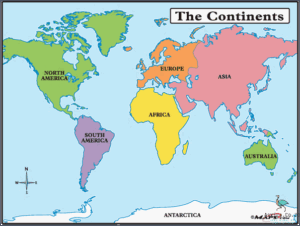
South Africa is a diverse cultural nation with many tribes and ethnicities, each with its own unique history and traditions. It is home to the largest ethnic group in Africa, the Zulus, as well as the Xhosa, Ndebele, Tswana, Sotho, Pedi, Tsonga, Swazi and Venda. There are also numerous minority tribes and ethnicities, such as the Khoi, San, Khoisan and white South Africans. In total, there are 11 official languages and over 40 tribes in South Africa. This diversity in culture and language makes it a fascinating and vibrant country to live in.
Contents
- 1 How Many Tribes In South Africa
- 2 Overview of the Different Tribes: Nguni, Sotho-Tswana, Tsonga-Shangana, Venda, Pedi, Khoisan
- 3 Cultural Significance of Tribes: Cultural Practices, Language, Cuisine, Beliefs
- 4 Challenges Faced by Tribes: Displacement, Discrimination, Lack of Representation
- 5 Conclusion
How Many Tribes In South Africa
South Africa is home to a rich and diverse population of people, many of whom are organized into distinct groups known as tribes. There are currently 11 official tribes in South Africa, including the Xhosa, Zulu, Pedi, Tswana, Swazi, Venda, Ndebele, Tsonga, Khoisan, Griqua, and their descendants, the Cape Coloureds. Each tribe has its own unique culture and traditions, with many speaking their own language and having their own customs and beliefs. Despite the differences between them, the tribes in South Africa have a common history and share many common values.
Overview of the Different Tribes: Nguni, Sotho-Tswana, Tsonga-Shangana, Venda, Pedi, Khoisan
South Africa is a culturally and ethnically diverse nation. With a population of over 59 million people, the country is home to a variety of different tribes and ethnic groups. In this blog post, we’ll explore the history and characteristics of the different tribes of South Africa, including the Nguni, Sotho, Tswana, Tsonga, Shangana, Venda, Pedi, Khoisan, and others.
The Nguni people are the largest ethnic group in South Africa, making up almost two-thirds of the population. Originating in the eastern part of the country, the Nguni are made up of several different tribes, including the Zulu, Xhosa, Swazi, and Ndebele. Characterized by their vibrant, colorful culture, Nguni people practice traditional ceremonies and ceremonies involving music, dancing, and storytelling.
The Sotho is the second-largest ethnic group in the country and is located mainly in the highveld regions of South Africa. With a strong emphasis on family and community, the Sotho are known for their traditional craftsmanship and for their distinct traditional clothing. They are also well-known for their lively music and dance.
The Tswana people are the third largest ethnic group in South Africa, located mainly in the Northern Cape, Gauteng, and Free State. Known for their strong sense of community and their love of music, the Tswana are highly respected and have a long history of being a proud people.
The Tsonga is the fourth largest ethnic group in South Africa, and is located mainly in the Limpopo and Mpumalanga provinces. Known for their vibrant culture, the Tsonga are also known for their traditional music and dance.
The Shangana people are the fifth largest ethnic group in South Africa, and are located mainly in the Limpopo province. Characterized by their vibrant traditional culture, the Shangana are known for their traditional dances and their strong sense of community and family.
The Venda are the sixth largest ethnic group in South Africa and are located mainly in the Limpopo province. With a strong focus on tradition and culture, the Venda are known for their traditional music and dance, as well as their vibrant, colorful clothing.
The Pedi are the seventh largest ethnic group in South Africa and are located mainly in the Limpopo and Mpumalanga provinces. Known for their strong sense of community and their vibrant traditional music and dance, the Pedi are also known for their traditional crafts, such as pottery and basket weaving.
The Khoisan are the eighth largest ethnic group in South Africa and are located mainly in the Northern Cape and Western Cape provinces. Characterized by their distinct language and traditional music and dance, the Khoisan are known for their colorful clothing and for their unique culture and beliefs.
In conclusion, South Africa is a unique and diverse nation made up of several different tribes and ethnic groups. From the vibrant Nguni to the distinct Khoisan, each tribe has its own distinct culture, history, and beliefs, and all of them are important parts of the South African identity.

Cultural Significance of Tribes: Cultural Practices, Language, Cuisine, Beliefs
South Africa is an incredibly diverse nation, home to a variety of cultures and tribes. In fact, there are over 40 different tribes in South Africa, each with its own language, cuisine, beliefs, and cultural practices. These tribes represent the unique history of South Africa and the cultural significance of each tribe is a testament to its rich and vibrant culture.
The most prominent tribes in South Africa are the Zulu, Xhosa, Sotho, Ndebele, and Tswana. Each of these tribes has their own language and customs that make them distinct from one another. The Zulu, for instance, speak isiZulu and are known for their vibrant and energetic dance and music. The Xhosa, on the other hand, are renowned for their distinct Xhosa beadwork and their traditional attire. The Sotho, Ndebele, and Tswana all have their own unique languages and customs as well.
The language spoken by each tribe is an integral part of their identity and culture. The Zulu, Xhosa, Sotho, Ndebele, and Tswana all have their own languages, which are incredibly distinct from one another. The Zulu language is especially unique, as it is derived from a combination of Bantu languages and isiZulu. The Xhosa language, on the other hand, is derived from the Khoisan language and is spoken by members of the Xhosa tribe.
The cuisine of each tribe is also an important aspect of their culture. The Zulu people are known for their spicy dishes and traditional beer and wine. The Xhosa, meanwhile, are renowned for their traditional maize dishes and their unique beer and wine. The Sotho, Ndebele, and Tswana all have their own distinct cuisines as well.
The beliefs and cultural practices of each tribe are also significant to their culture. The Zulu people believe in ancestor worship and have a variety of traditional ceremonies and rituals. The Xhosa, meanwhile, practice a variety of rituals and customs that are related to their beliefs and customs. The Sotho, Ndebele, and Tswana all have their own distinct beliefs and practices as well.
The cultural significance of the various tribes in South Africa is immense, and it is important to appreciate and honor the unique cultures of each of these tribes. From the languages they speak to the cuisines they enjoy to the beliefs and cultural practices they practice, each tribe has something unique and valuable to offer to the South African culture. By recognizing and celebrating the cultural significance of each tribe, we can ensure that the history and culture of South Africa remains alive and vibrant.
Challenges Faced by Tribes: Displacement, Discrimination, Lack of Representation
Tribes in South Africa are an integral part of the country’s cultural heritage, encompassing a rich and diverse array of peoples. With this cultural diversity comes an array of unique challenges faced by tribal communities in South Africa. From displacement and discrimination to a lack of representation in government and other systems, tribes in South Africa face an array of struggles that can prove difficult to overcome.
Displacement is one of the major challenges faced by tribes in South Africa. Many tribal communities have been forcibly displaced from their lands, leaving them with limited access to resources and opportunities. These displacements have resulted in the fragmentation of tribal communities and the loss of traditional practices and customs. This has had a particularly damaging impact on the traditional livelihoods of many tribes, who rely on their lands for subsistence and economic activities.
Discrimination is another of the major issues faced by tribes in South Africa. Discrimination against tribes has been a long-standing problem, especially when it comes to access to education, employment and other services. Discrimination against tribes is often rooted in stereotypes and prejudices, leading to limited opportunities for these communities to thrive and develop. This can be especially damaging for younger generations, who are prevented from achieving their full potential due to discrimination.
A lack of representation is another of the major challenges faced by tribes in South Africa. Despite their large presence in the country, tribal communities are often not adequately represented in government and other systems. This has resulted in limited access to resources and opportunities, with tribes often excluded from decision-making processes that affect their lives. As a result, many tribes have been unable to advocate for their rights and secure their futures.
It is clear that tribes in South Africa have faced and continue to face a range of complex challenges. From displacement and discrimination to a lack of representation in government and other systems, tribes in South Africa are struggling to secure their futures in an ever-changing world. Despite these challenges, tribes in South Africa have remained resilient and have made significant progress in recent years. For their futures to remain secure, however, it is essential that tribes continue to be supported and that their rights are upheld.
Conclusion
After researching the question of "How Many Tribes In South Africa", it is evident that there are 11 officially recognized ethnic groups in South Africa which are referred to as tribes. These tribes include the Nguni, Sotho, Tsonga, Venda, Xhosa, Swazi, Pedi, Tswana, Ndebele, Khoisan, and Colored. The population of South Africa is made up of a diverse mix of these 11 tribes, each with their own unique language, culture, and history. Overall, South Africa is an incredibly diverse country, and the 11 tribes that make up its population are a testament to this.




